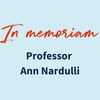2019-05-29
- Auinash Kalsotra (Biochemistry) and Supriya Prasanth (Cell and Developmental Biology) received 2019 Campus Distinguished Promotion Awards from the University of Illinois Office of the Provost. These awards celebrate scholars whose contributions have been extraordinary in terms of quality of work and overall achievement.
- 2019-05-13 - From weakly electric fish to a robotic cockroach to a novel approach to using wireless networks for emergency response, Mark E. Nelson’s research career exemplifies the success of an interdisciplinary approach through his work in the Department of Molecular and Integrative Physiology and the Beckman Institute.
- 2019-05-13 - Researchers report that a protein known to be important to protein synthesis also influences muscle regeneration and regrowth in an unexpected manner. The discovery, reported in the Journal of Clinical Investigation, could one day lead to new methods for treating disorders that result in muscle weakness and loss of muscle mass, the researchers said.
- 2019-04-24 - Professor William Brieher has been selected by an awards committee to receive the LAS Dean’s Award for Excellence in Undergraduate Teaching, alongside four other professors at Illinois. This honor grants the recipients $1,000 to support their teaching and research, while a one-time increment of $2,000 will be added to the annual salary base of each recipient.
- 2019-04-22 - The latest paper by the Kuzminov lab investigates the mechanism of thymineless death, which is a common mode of action of anti-cancer and anti-bacterial drugs. The findings were published in a paper titled "Sources of thymidine and analogs fueling futile damage-repair cycles and ss-gap accumulation during thymine starvation in Escherichia coli" in DNA Repair.
- 2019-04-07 - The latest paper by the Shapiro lab looks at the effect of mutations in the estrogen receptor on the growth and spread of breast cancer cells. The findings were published in a paper titled "Estrogen-independent Myc overexpression confers endocrine therapy resistance on breast cancer cells expressing ERαY537S and ERαD538G" in Cancer Letters.
- 2019-04-03 - Microbiologist Ralph Wolfe contributed to a study of microbes that led to the discovery of a third superkingdom, or domain, of life: the archaea. Wolfe, a professor emeritus of microbiology at the University of Illinois, died March 26 in Urbana. He was 97.
- 2019-03-14 - Professor Kannanganattu Prasanth led a team that found that certain genes that don’t code for proteins could play an important regulatory role in breast cancer.
- 2019-03-12 - The School of Molecular and Cellular Biology creates an inspiring new space for instruction and advising.
- 2019-02-19 - A career spanning six decades, over 400 papers, 25 graduate students, and numerous awards surely means a relaxing retirement? Not quite. Govindjee, at 86 years, is still dissecting the mechanisms of photosynthesis. He also collaborates with researchers across the globe to improve crops for food and energy production.
- 2019-02-04 - The latest paper by the Kuzminov lab describes the development of a highly sensitive method to probe the nature of DNA replication in E. coli. The findings were published in a paper titled “Near-continuously synthesized leading strands in Escherichia coli are broken by ribonucleotide excision” in the Proceedings in the National Academy of Sciences.
- 2019-01-18 - The latest paper by the Brooke lab investigates the mechanism through which an Influenza A-infected host cell can be rendered resistant to subsequent viral infections. The findings were published in a paper titled “Influenza A Virus Superinfection Potential Is Regulated by Viral Genomic Heterogeneity” in mBio.
- 2019-01-16 - The Zhang lab recently published a paper in Cell Chemical Biology titled "Optogenetic delineation of receptor tyrosine kinase subcircuits in PC12 cell differentiation."
- 2019-01-15 - Discovery provides deeper insight into DNA and the fight against cancer.
- 2018-12-31 - Prof. Ann Nardulli, an endocrinologist and cherished MIP faculty member, passed away on June 27, 2018. To honor Ann’s memory, we present excerpts of a conversation between Ann and Assistant Prof. Catherine Christian, conducted in September 2016 on the occasion of her retirement.














